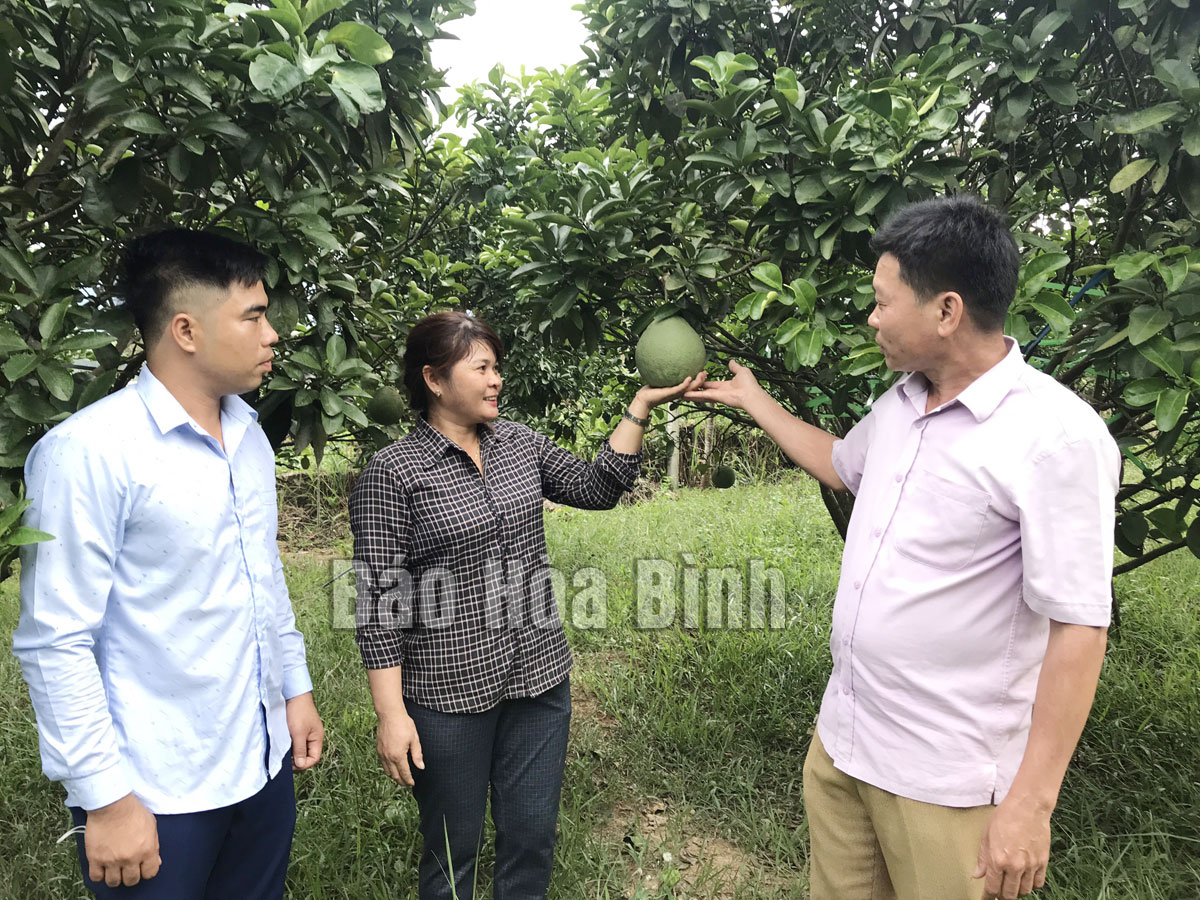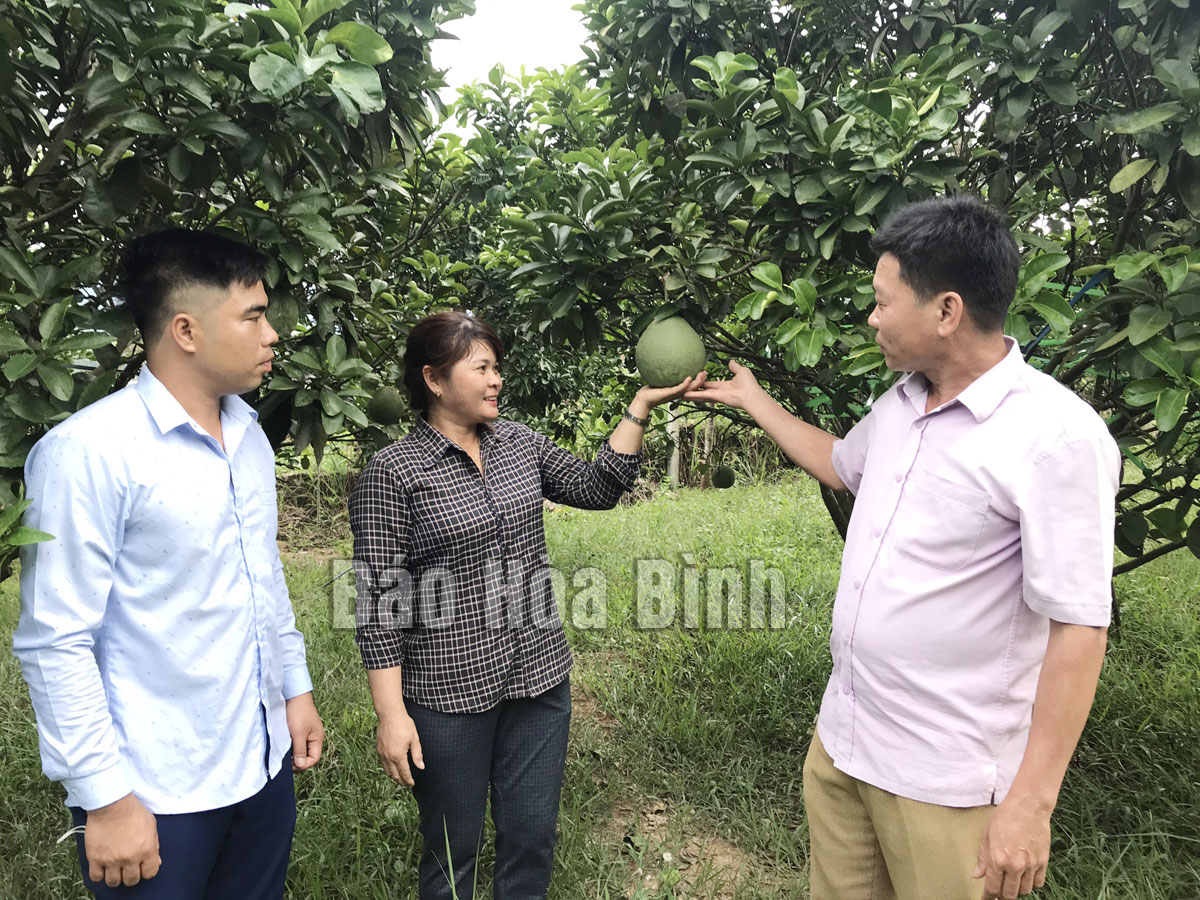
(HBO) - Over the past years, the Party Committee of Ngoc My commune (Tan Lac) has led the implementation of resolutions on socio-economic development, with focus on building effective economic models, introducing plants and animals with high economic value, building transport infrastructure, thus improving living standards and income for locals.
A pomelo
farm of Bui Thi Hieu in Cau Phung hamlet, Ngoc My commune (Tan Lac) generates
income of over 150 million VND a year.
Bui Van Duong, Secretary of the commune Party
Committee said: "The commune Party Committee has 17 Party cells, of which there
are 13 Party cells of hamlets, one of the health station, one of the public
security force, and two of local schools, with 343 Party members in total. In
the past term, the commune Party Committee led locals in developing the local
economy by switching to high-value crops, and expanding commodity production.
Priority was also given to developing handicrafts, light industry, and
services. The commune paid attention to building infrastructure and transport
system to create favourable conditions for locals’ production, attracting
investment and creating jobs for local workers, along with fostering a cultural
and civilized lifestyle, and protecting the environment, so as to gradually
give the commune a facelift”.
To support local production development, since
2020, the commune has organised three training courses on citrus fruit growing,
chicken farming, and mechanics. It has implemented credit programmes through
mass associations, unions and 22 savings and borrowing groups in the locality.
Currently, Hai Ha Green Fruit Company which specializes in fruit processing and
trading has signed contracts to buy products from local farmers, helping
ensuring the sale of local fruits. Many households have changed crops and
livestock and formed effective economic models. Industrial production,
handicrafts, and services are maintained and expanded, thereby creating jobs
for local workers.
From a commune with many difficulties, Ngoc My
has gradually changed for the better under the leadership of the Party
Committee.
To date, all main hamlet roads have been
concreted and paved. The commune has fulfilled 17 out of 19 new-style rural
area building criteria, and is striving to complete all criteria in 2022. The
commune’s average per capita income reaches 49.3 million VND per year, the
poverty rate decreases to 6.31 percent, and social security and safety are
maintained./.
In the spirit of "Party members go first, the people follow”, all households of Party members in the Doan Ket sub-region in Da Bac town, Da Bac district, voluntarily removed gates and fences, and donated land when the road expansion project passed through their properties. Inspired by their example, 68 households in the sub-region quickly followed suit, contributing over 1,400 sq.m of residential and perennial cropland to widen the main road through the residential area. The exemplary role of Party members in Doan Ket stands as a shining example of studying and following President Ho Chi Minh’s thought, morality, and lifestyle.
The Hoa Binh provincial People's Committee held a monthly meeting on May 29 to assess the implementation of socio-economic development tasks in the first six months of 2025, the progress of key projects, and some other important issues.
During his lifetime, President Ho Chi Minh always expressed his deep affection and special concern for children and youth. He once emphasized: "Caring for and educating children well is the responsibility of the entire Party and the entire people”; "First of all, the family (i.e. grandparents, parents, siblings) must do this job well”. "the Party Committees…, the Children’s Committee, the Youth Union, the education sector, and all related organizations must have specific plans to ensure children grow healthier and more progressive”. His teachings has been remaining valuable and serving as the guiding principles in the work of protecting, caring for, and educating children. In line with this ideology, Hoa Binh Province has continuously been prioritizing and investing resources in the well-being of children in recent years.
Mr. Nguyen Phi Long, the alternate Member of the Party Central Committee and Secretary of the Provincial Party Committee chaired the meeting of the Standing Committee of the Provincial Party Committee to provide opinions on several investment projects within the province. There was the attendance of Ms. Bui Thi Minh, the Permanent Deputy Secretary of the Provincial Party Committee and Chairwoman of the Provincial People’s Council; Mr. Bui Đuc Hinh, the Deputy Secretary of the Provincial Party Committee and Chairman of the Provincial People’s Committee and other members of the Standing Committee; the leaders from other departments, agencies, and some localities.
The Standing Board of the Vietnam Fatherland Front (VFF) Committee of Hoa Binh province held a meeting on May 28 to honour outstanding village elders, village heads, and reputable individuals from local ethnic minority and religious communities.
In mid-May, the provincial Museum organised an exhibition named "Duoi la co Dang Cong san Viet Nam quang vinh” (Under the flag of the glorious Communist Party of Vietnam). This meaningful activity took place in the joyful atmosphere to celebrate the country's major holidays and the Party congresses at all levels for the 2025-2030 term, towards the 14th National Party Congress.



